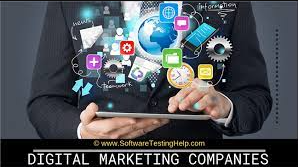best companies in digital marketing

best companies in digital marketing
And who better to turn to for help than the best companies in best companies in digital marketing? These powerhouses of the industry have proven time and again that they can drive results and help businesses thrive in the online space. From tech giants like Google and Amazon to consulting firms like Deloitte and Accenture, we’ve compiled a list of some of the top players in digital marketing. So if you’re looking to up your game in the online realm, read on!
Google is undoubtedly one of the most well-known companies in the world, and for good reason. As a search engine giant, Google has completely revolutionized how we access information online. But they’re much more than just a search engine – they’ve also become leaders in digital marketing.
One of Google’s biggest strengths lies in their advertising platform, Google Ads. This powerful tool allows businesses to target specific audiences with precision, ensuring that their ads are seen by potential customers who are likely to be interested in what they have to offer.
In addition to this, Google Analytics is another valuable asset for anyone looking to up their digital marketing game. With this tool, businesses can track website traffic and user behavior – insights which can then be used to inform marketing strategies going forward.
And let’s not forget about YouTube – owned by Google since 2006. This video-sharing platform has become an incredibly popular destination for users worldwide and offers ample opportunities for businesses looking to reach new audiences through video content.
It’s clear that when it comes to digital marketing, Google is a force to be reckoned with. Their suite of tools and platforms provides everything a business needs to succeed online.
Amazon
Amazon is not just an online marketplace, it’s also a company that has made great strides in digital marketing. With its vast resources and data-driven approach, Amazon is one of the best companies in digital marketing today.
One of Amazon’s biggest strengths lies in its ability to personalize content for users. Through advanced algorithms and machine learning, Amazon can analyze user behavior and recommend products tailored to their interests. This level of personalization has proven to be very effective in increasing sales and customer loyalty.
Another way Amazon excels at digital marketing is through its use of targeted advertising. With access to massive amounts of data on consumer behavior, Amazon can deliver highly relevant ads that are more likely to convert into sales.
In addition, Amazon also invests heavily in search engine optimization (SEO). By optimizing their product pages for specific keywords and phrases, they rank higher on Google searches which drives more traffic to their site.
With its innovative strategies and data-driven approach, there’s no doubt that Amazon deserves a spot on the list as one of the best companies in digital marketing today.
Microsoft
Microsoft is another company that has made a significant impact in the digital marketing industry. Although it is primarily known for its software and hardware products, Microsoft has also expanded its reach by offering a wide range of digital marketing services.
Apart from Bing Ads, Microsoft also offers Dynamics 365 Marketing – an all-in-one marketing automation solution designed to help businesses improve their customer engagement strategies through personalized content creation and streamlined campaign management.
Deloitte
Deloitte is one of the top digital marketing companies in the world, offering a wide range of services to businesses across different industries. With over 100 years of experience, Deloitte has built a reputation for delivering innovative solutions that help clients stay ahead in their respective markets.
In addition to its technical prowess, Deloitte also boasts a team of highly skilled professionals who well-versed in the latest trends and best practices shaping the digital landscape. From data analysts and content strategists to UX designers and project managers, every member works collaboratively to deliver impactful results.
Accenture
Google, Amazon, Microsoft, Deloitte and Accenture are without a doubt some of the best companies in digital marketing. Each of these companies has shown excellence in their approach to digital marketing and have helped numerous businesses achieve success through innovative strategies.




